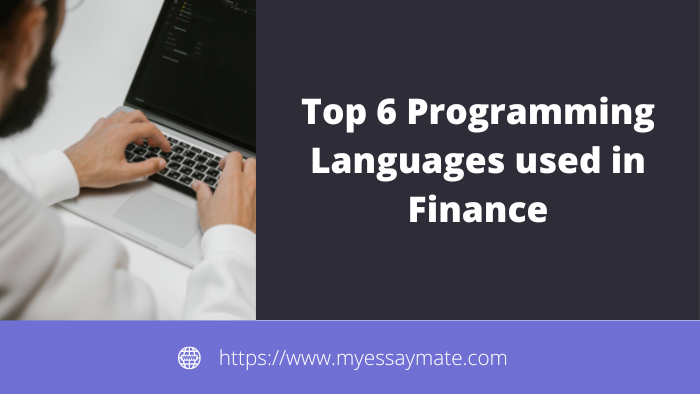
October 17, 2022
Top 6 Programming Languages used in Finance
No 1 Assignment Help
is only a click away.
Top 6 Programming Languages used in Finance
According to the market data prediction, "the worldwide financial technology industry is predicted to grow steadily and reach a market size of around $324 billion by 2026, rising at a compound annual rate of roughly 25.18% over the forecast period 2022-2027."
The financial sector has always been quite open to new technology. Computing technology, as well as the internet, were created to be the ideal force multiplier for banks. It is because of the enormous volume of transactions, low-risk tolerance, and requirement for immediate processing.
However, all of that tech must be created. If not directly, then through partnerships with the top IT companies, banking has been at the vanguard of that. According to their earnings reports, banks are among the majority of IT businesses' most incredible clients. Banks now directly invest in many of these IT companies and fintech start-ups due to their growing curiosity about IT. Some even have internal teams working on cutting-edge technology like blockchain.
Although much of this information is intriguing, programming knowledge is required to complete the task. Throughout your learning in computer science, you will come across many programming languages. While some of them can be intriguing, the assignments based on them can give you a hard time processing. But do not worry because the programming assignment help is right here!
Alternatively, you may think about learning Python or Android applications. What new languages are required for fintech and finance? To create fintech applications, financial modelling, perform simulations, data science, or develop artificial intelligence trading algorithms?
Well, these are just a few questions that roam around your head, and this blog is the answer to them. Read on to learn the most programming languages used in finance.
What is fintech?
The word "financial technology," which can apply to innovative technology that enhances the operation of both business- and consumer-oriented financial services, is abbreviated as "fintech." Financial institutions or other enterprises frequently use it to improve financial performance. However, it can also be used to describe financial actions like using online and digital services to pay bills, transfer money, or deposit checks. Fintech businesses provide new products that give users revolutionary ways to achieve their financial objectives.
What are the essential programming languages used in the finance industry?
Here are the top six programming languages used in the finance sector, making it super-efficient, easy and safe:
Java
As we all know, Java is a general-purpose language that may be used to create apps and programmes for various uses. Java's adaptability (it may be found on websites, mobile devices, and internet-connected appliances) has contributed to a revolution in how we finance and shop. Programmers use the language to create trading algorithms for quantitative finance, banking applications, and e-commerce platforms.
Java's "write once, run anywhere" platform contributes to its sustained success. Thus, Java-based programmes can execute on any computer. Portability is crucial in the financial industry, where programmers, businesses, and customers may all use various devices and operating systems.
Python
Python is influential in fintech, which isn’t surprising to anyone. As per the programming assignment help, Python is ranked as the most popular programming language in the world, according to Google searches catalogued by PyPI.
Python has a simple syntax and is simple to read. Additionally, it makes a crucial point that might be employed to recognise intricate financial problems. It may also be scaled to accommodate the requirements of a wide range of financial institutions, from modest start-ups to massive global banks and trading businesses.
Python's extensive tool and package library make life considerably simpler for programmers by preventing them from spending time and effort on starting from scratch, says the assignment help mentors. Python is helpful in data science, machine learning, and AI, which drive critical technologies in financial services due to its functionality and variety of resources. Because of these characteristics, Python is among the best programming languages for accounting and finance.
As you learn more about computer languages, pay attention to how frequently Python appears in textbooks, says the programming assignment help. For instance, Python is covered in the courses offered at the Columbia Engineering Coding, Data Analytics, and FinTech Boot Camps.
The most valuable coding languages used in business today can be introduced in great detail at these boot camps.
Scala
Scala is a coding language that supports functional and object-oriented programming. Many front-end developers work with Scala because it combines compact syntax with powerful development tools when building projects. This language is a popular choice for Fintech companies that work with data architecture and cloud-based platforms, so learning Scala can be helpful if you want to develop mobile applications.
C++
Another popular programming language, C++, originates from a college thesis from the late 1970s. Without slowing down or losing its utility, Bjarne Stroustrup aimed to incorporate object-oriented programming into the language used for programming, and C++ is what came of it.
Because it is a sequence of instructions, a compiler converts its code to machine language—C++ is thought to be particularly quick. The computer works more effectively since it needs less translation to understand the code you're producing.
C++ has been used for many years by businesses, especially financial institutions, to create software, software platforms, and other goods. Due to its duration, C++ has become ingrained in various sectors, including banking and fintech. It is frequently employed in quantitative finance as well. Thousands of tools and libraries have also been created by developers to support its use. In addition, because of its speed, C++ is still a favourite language for machine learning and AI, despite its age.
JavaScript
One of the languages most frequently utilised by businesses that run interactive websites is this one. JavaScript is a popular choice for developers. Interestingly, the language is popular for those who want to specialise in web development because it offers capabilities that help design dynamic websites. Studying JavaScript can be an excellent choice if you're interested in developing mobile or desktop apps. Front-end programmers and software engineers frequently use it.
If you are a computer science major and find yourself jammed up with multiple assignments on your table, just know that you are free to ask for help from an assignment help mentor! It is convenient, accessible and super fun!
MATLAB
Using MATLAB, machine learning applications in finance, such as algorithmic trading, asset allocation, sentiment classification, credit analysis, and fraud detection, are developed and deployed by quants and financial information scientists.
A programming language with a focus on mathematical operations is called MATLAB. MATLAB is a popular option for businesses that concentrate on long-term investments because many financial professionals utilise a range of various formulae and algorithms to plan their investments. Using interactive graphing features provided by this language, analysts and investors can coordinate their economic strategy.
It's crucial to remember
that banks' advising and corporate/investment banking divisions account for a sizable portion of their profits. Since these firms can't really be automated, at least not with current AI, they are more challenging to target. The bottom line is that FinTech should be viewed as a fantastic opportunity from a professional standpoint. Banks, IT businesses, and new start-ups would highly seek those with the appropriate skills.
Like this blog? Get in touch with our experts and find the most fantastic programming assignment help at the lowest price!
Related Blogs
Subscribe Our Newsletter & get Information about latest courses









